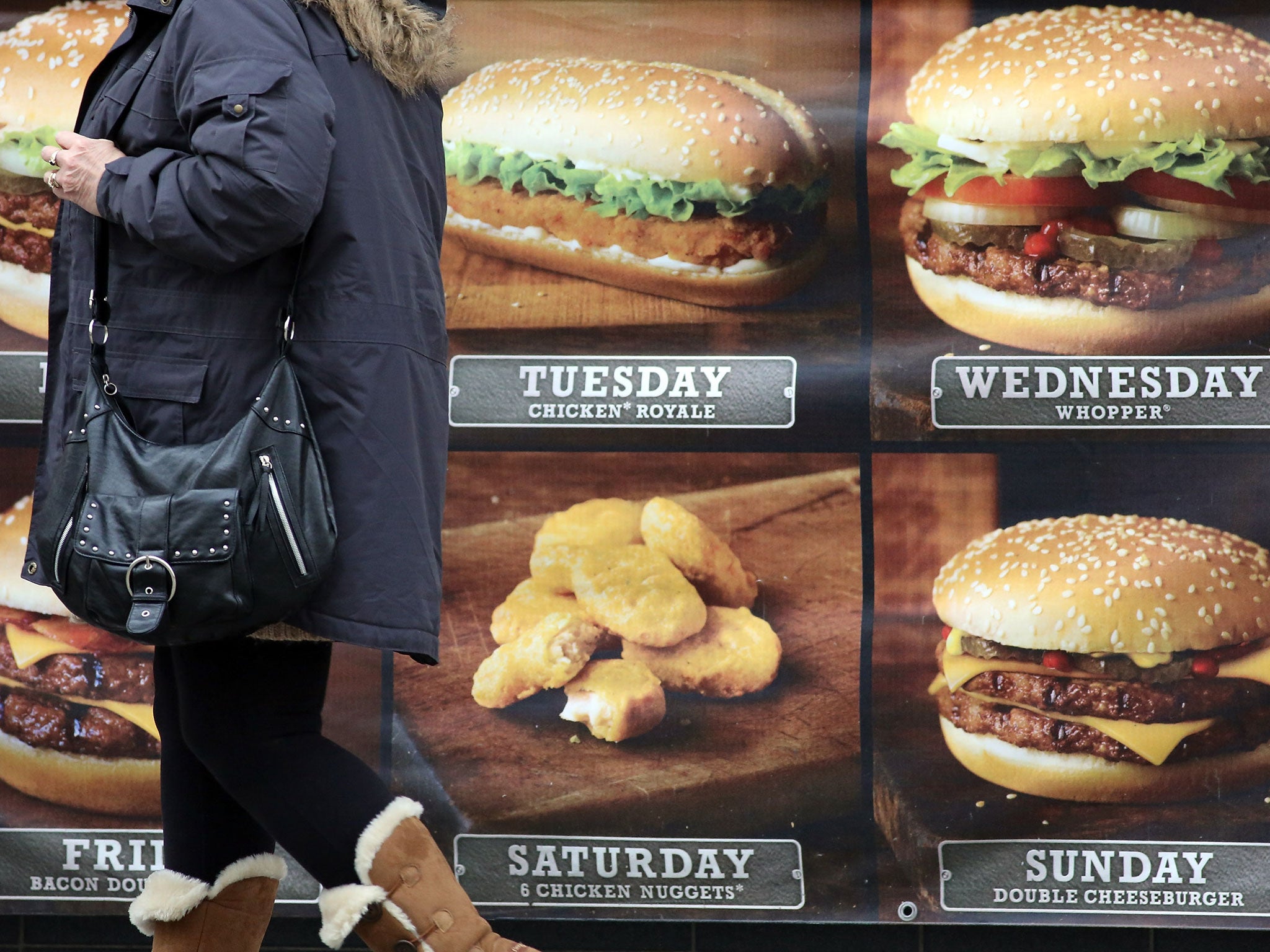Government attacked over deals with fast-food industry: ‘Pure illusion’ to think this approach can cut obesity
Scathing World Health Organisation report warns UK cannot tackle epidemic unless Government changes policy

The Government’s plan to fight obesity through voluntary deals with fast-food chains is founded on “pure illusion” and will lead to ever-worsening ill health in Britain, a leading expert claims today.
In a wide-ranging report for the World Health Organisation, Professor Roberto de Vogli of the University of California and other leading academics said all the evidence pointed to government regulation of the fast-food industry as the only way to slow down or reverse the world’s escalating obesity epidemic.
The Government has consistently held back from passing legislation to limit the marketing activity of the fast-food industry and improve the nutritional value of their products.
Speaking to The Independent, Professor de Vogli highlighted this flawed approach, which he said was typical of countries with the worst rates of obesity.
“The UK has a deregulated, liberal economy model,” he said. “There are a few supermarkets that dominate the food system, a high concentration of market shares in few hands and substantially high levels of fast-food consumption and ultra-processed food production. In terms of Body Mass Index (BMI) and obesity the UK is one of the top five of our 25 sampled countries.”
Asked about the Government’s voluntary “responsibility deals” with industry, which the Department of Health claims “tap into the potential for businesses and other influential organisations to make a significant contribution to improving public health”, Professor de Vogli was scathing.
“There is no question,” he said. “Big corporations have a mission to maximise profit. If we hope and expect that profit-driven businesses will safeguard public health, it is pure illusion.”
In their report, published in the Bulletin of the World Health Organisation today, Professor de Vogli and his colleagues from Queens University Belfast and the University of Texas found that obesity rates have risen alongside increases in the number of fast-food purchases made each year.
The slowest increases in fast-food transactions occurred in countries with the strictest market regulation, such as the Netherlands, Greece and Italy. Across 25 sample countries, people’s average BMI was found to have increased from 25.8 to 26.4 between 1999 and 2008.
A BMI of more than 25 is considered overweight and BMI of more than 30 obese.
A 2012 survey of adults in England found that more than a quarter are obese, while 41 per cent of men and 33 per cent of women are classed as overweight.
Obesity increases the risk of heart disease, diabetes and has even been linked to a heightened chance of developing dementia later in life. Health problems directly linked to obesity already cost the NHS £5bn a year.
The researchers said that a number of interventions would be needed in all of the world’s developed nations to slow the obesity epidemic, which they said would also increasingly affect developing nations during the coming decades.
Policies that governments should adopt include subsidising fruit and vegetable growers’ economic disincentives for producers of ultra-processed fast food such as french fries, burgers, soft drinks, sweets and ready meals; and penalties for excessive use of fertilisers, pesticides, chemicals and antibiotics, the report said.
Fast-food and soft-drinks companies should also be restricted in their advertising activity, particularly on promotions aimed at children, they argued.
“Governments should take steps to regulate the economies – not let the invisible hand of the market self-regulate the food system,” Professor de Vogli said. “That will only lead to more obesity in the future.”
A spokesperson for the Department of Health said the Government was “serious” about tackling obesity, and acknowledged that England has some of the highest obesity rates in the world.
Action was being taken to “make it easier for people to make better choices,” they added.
“Through initiatives such as Change4Life, NHS Health Checks and the National Child Measurement Programmes in schools, we are taking the lead in helping tackle obesity and are seeing encouraging signs of progress, with obesity rates in children falling to their lowest levels since 1998,” they said.
Subscribe to Independent Premium to bookmark this article
Want to bookmark your favourite articles and stories to read or reference later? Start your Independent Premium subscription today.

Join our commenting forum
Join thought-provoking conversations, follow other Independent readers and see their replies